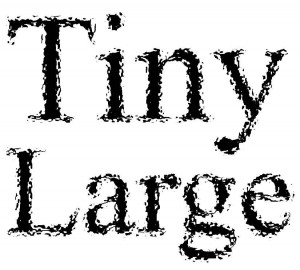Talking small business marketing with a business owner caught up in the idea of transparency, we got into a discussion about cues he regularly communicates which signal he has a very small business. While his point about absolute transparency is noble, my take was his small business marketing messages wind up over-communicating. They provide context that’s neither necessary nor relevant for his potential or current clients to make informed decisions about using his company.
His small business marketing effort represents a relatively common situation: inadvertently or deliberately marketing the parts and pieces of a business instead of the benefits and results a brand provides.
 In this type of situation, sharing too much detail in small business marketing messages can provide information on the inner workings of business customers may not even care about knowing. It's far better to focus on and secure agreement to the results a brand will deliver for a customer.
In this type of situation, sharing too much detail in small business marketing messages can provide information on the inner workings of business customers may not even care about knowing. It's far better to focus on and secure agreement to the results a brand will deliver for a customer.
My advice for small business people marketing against larger competitors is to change the nature of your marketing messages to help de-emphasize size by:
- Describing situations potential customers can easily relate to rather than naming specific clients - This allows a single client’s situation to potentially yield multiple case studies which demonstrate benefits you provide.
- Talking percentages, not absolute numbers - Say "75% of our clients" vs. "3 of our clients."
- Not being overly precise about the company's size - For example, share “there are two primary point people” vs. “there are two of us.” The latter says there are only two people involved; the former, which is just as accurate, discloses two “primary” people, but leaves room for the possibility others might be involved.
- Talking about specific experiences only when absolutely necessary for clarity - Covering your capabilities with actual, generalized examples (vs. saying, "for client X, we did Y") allows one client experience to be shared in multiple ways. Detailing particulars tied to an individual client gives you much less to talk about when it comes to your experience.
Using this strategy for your small business marketing messages allows much greater flexibility in how to best organize and deploy resources to create very satisfied customers.
Knowing there are many solopreneurs and small business owners reading the blog, I’d love to hear how you deal with the issue of appearing bigger than you are and marketing the benefits you provide. Is this a transparency-related issue for you? What strategies do you use for creating your small business marketing messages?– Mike Brown
The Brainzooming Group helps make smart organizations more successful by rapidly expanding their strategic options and creating innovative plans they can efficiently implement. Email us at brainzooming@gmail.com or call us at 816-509-5320 to learn how we can deliver these benefits for you.



